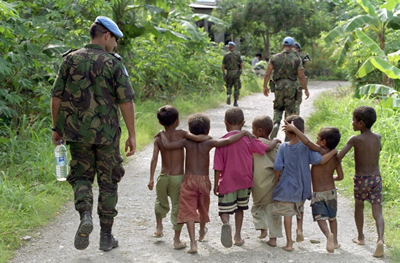 I’m painting a room in my house. Anyone who’s taken on a home project knows that picking a paint color can be a truly excruciating drill. I’ve got blue on the brain (there’s a fair amount of “UN Blue” found in our offices) but “UN Blue” isn’t an option from Sherman Williams.
I’m painting a room in my house. Anyone who’s taken on a home project knows that picking a paint color can be a truly excruciating drill. I’ve got blue on the brain (there’s a fair amount of “UN Blue” found in our offices) but “UN Blue” isn’t an option from Sherman Williams.
This exercise got me thinking about the symbolic power of the UN’s famed blue found on its peacekeepers uniform. That blue helmet (or beret) is so much more than a symbol. It represents hope.
Recently I heard U.S. Congresswoman Sheila Jackson Lee describe UN peacekeepers as “a lifeline” for the people where they are stationed. Peacekeepers have stepped into some of the most difficult and unforgiving environments to restore stability and allow hope to return to families, communities, regions and countries. Some children see the sight of a peacekeeper as a personal hero as they realize what a peacekeeper’s presence in their neighborhood or town represents for their future.
Providing security to violent areas is not a simple task. Last year 112 peacekeepers died and another 27 have died since the beginning of 2012. Peacekeepers represent a change in the power dynamic – away from those who want to maintain a violent and unstable environment to one that looks past conflict and toward a peaceful and productive future. The UN relies on 117 counties to contribute troops to its peacekeeping forces. Currently, at the direction and mandate of the UN’s Security Council, the UN maintains 17 missions worldwide.
The UN’s Department of Peacekeeping Operations (DPKO) oversees the second largest deployed military force in the world, with over 120,000 military personnel restoring stability across the globe. The United States does not provide any conflict zone troops to the UN peacekeeping forces. Much of U.S. support is found through financial contributions and dues to the UN, and the U.S. also provides critical resources and training for these missions.
The benefits of the UN’s peacekeeping operations for the U.S. are clear:
- The U.S. can promote democratic governance, a key U.S. foreign policy priority. UN peacekeeping operations provide security in order to prevent political violence and allow elections to proceed freely and fairly. These operations also build capacity for sustainable governance, promote rule of law, and support human rights in fragile post-conflict states.
- The U.S. shares the burden of promoting international security. UN peacekeeping draws upon the economic and human resources of UN Member States, allowing the U.S. to share the burden of protecting global peace and collective security and reducing the need for unilateral intervention.
- The U.S. saves money since UN Peacekeeping is a cost-effective way to prevent conflict, keep the peace, and rebuild societies emerging from war. UN peacekeeping forces cost the U.S. taxpayers a fraction of the cost if the U.S. opted to send troops ourselves.
On May 29, 1948 the UN launched its first peacekeeping operation in the Middle East. While peacekeeping operations through the years have experienced imperfection, millions of people have the UN peacekeepers to thank for their safety and security since its inception. Each year on May 29 we take a moment to reflect on the impact of the UN on the world’s peace and security, the UN’s role in stabilizing countries, and the lives saved. You can share your appreciation with a peacekeeper through the Better World Campaign’s Thank a Peacekeeper effort. Let them hear your voice directly.
Inspired to finish my DIY paint job, I’ve made my final color decision: Hero Blue. A visual reminder of hope in my home and communities around the world is the perfect choice.



 View All Blog Posts
View All Blog Posts